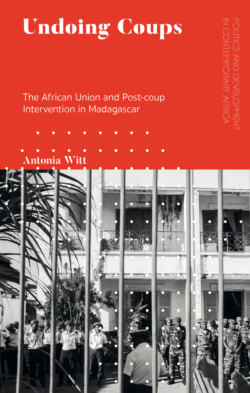Читать книгу Undoing Coups - Antonia Witt - Страница 9
На сайте Литреса книга снята с продажи.
ОглавлениеAcknowledgements
This book is the outcome of a long journey. As most books probably are. It was an intellectual journey, a physical journey, a challenging, joyful, and enriching journey. But first of all, it was an accompanied journey, even if sometimes it felt like a lonely endeavour. It is to all those who visibly and sometimes invisibly accompanied me throughout this time that I am deeply indebted. My thanks go first of all to Ulf Engel and Klaus Dingwerth, my PhD supervisors, for having had trust that I would find my way through empirical and theoretical jungles and for having been safety nets in case I threatened to get lost. The result of this is the basis of this book.
This research would not have been possible without the strong support I received particularly during field research. I am very thankful to Sirak Tesfaye, Chedza Molefe, Kirubel Getachew, Milka Mkemwa, and the other staff members of the AU archives and library whose efforts for keeping the organization’s records are admirable. I also thank my former colleagues from the EU Delegation to the African Union in Addis Ababa for being great teachers, informants, and friends. It was this time of diplomatic apprenticeship which convinced me that there exists a world of AU practices that is not yet reflected in academic writing. And it encouraged me to take the risk of trying to write it down.
I am deeply indebted to the team of the Friedrich-Ebert-Stiftung in Antananarivo for a sheer endless list of contacts, for inspiring discussions, and for letting me learn a lot about Malagasy political culture. My particular thanks go to Jean-Aimé Raveloson and Marcus Schneider, whose support during this time was invaluable. And I am grateful to Baovola and Narison Radanielina, Anne and Erich Raab, Toavina Ralambomahay, Tatiana Eddie Razafindravao, Friedrich, Giovanni, Bruno, Tops, Jan, the musicians of Mahaleo, and the people from Tany Malalaka for being very instructive company throughout my stay in Madagascar and beyond.
My greatest thanks, however, go to the many interviewees in Addis Ababa, Antananarivo, Pretoria, Johannesburg, Gaborone, Paris, and elsewhere who patiently shared their experiences, memories, opinions, personal diaries, letters, and newspaper collections with me. They may not be happy with everything I made of it. And not every detail of their stories may be covered sufficiently. But without their availability and openness, this book could not have been written.
The coming together of this book has also benefited from crucial academic support. The DFG-Emmy-Noether Junior Research Group ‘Changing Norms of Global Governance’ was a source of great inspiration and discovery that made me think differently about global order and international organizations. I am very thankful for (heated) discussions and great company to Klaus Dingwerth, Ina Lehmann, Ellen Reichel, and Tobias Weise. The German Research Foundation (DFG) also provided the financial means that made all of this possible in the first place. For critically engaging with parts of this book, for thought-provoking comments, critique, and suggestions, I am also grateful to my former colleagues from the Institute for Intercultural and International Studies at the University of Bremen, to my colleagues at the Cluster of Excellence ‘The Formation of Normative Orders’ at Goethe University Frankfurt/Main, and to Nicole Deitelhoff and Christopher Daase in particular. In 2014, I was lucky to spend two months as a guest researcher at the Department of International Relations at the University of the Witwatersrand, Johannesburg. I thank Malte Brosig for his great support during this time, as well as Gilbert Khadiagala, Anthoni van Nieuwkerk, Amy Niang, Mopeli Moshoeshoe, and Rod Alence for asking the right questions while I was slowly bringing order into a universe of observations and ideas from field research. Throughout the long journey, I presented several draft chapters and papers drawing on this research at academic conferences and workshops. I am particularly thankful to Linnéa Gelot, Christof Hartmann, Anna Holzscheiter, Simon Mason, Joel Migdal, Laurie Nathan, João Gomes Porto, and Klaus Schlichte for constructive feedback at different stages in time. While I revised this book manuscript, the Peace Research Institute Frankfurt (PRIF) became my new academic home. I am indebted to Sabine Mannitz and the entire institute for intellectually, financially, and administratively supporting the finalization of this book.
I want to express my gratitude to Anna Emil and Lilli Hasche for their support in transcribing interviews and to Maike Wäscher for invaluable help during the finalization of the manuscript. And I thank Felix Anderl, Kai Striebinger, and Micha Wiebusch, as well as the anonymous reviewers, for their wise thoughts and critical reading of previous versions of this book. Kim Walker and Melanie Scagliarini from Zed Books, as well as Megan Symons, have accompanied me very patiently and professionally through the different stages of the publication process. I thank them as much as I thank Felix Pahl for his remarkably thorough language editing, from which I learned a lot about the depths and facets of the English language. I finally thank my parents for letting me find my own path, even if it took me to faraway places, and for giving me the strength to pursue my own goals, even if they looked zany at first glance. And I thank Gabriel, who has been a constant encouragement and support in bringing this project to an end and not forgetting the other journeys life holds for us.
